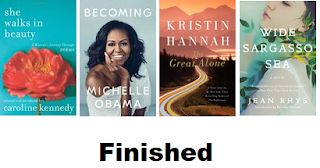The Friday 56 is hosted at Freda's Voice. Find a quote from page 56.
This is the book I'm highlighting right now---
Title: Where the Crawdads Sing by Delia Owens
Book Beginning: Prologue---
"Marsh is not swamp. Marsh is a space of light, where grass grows in water, and water flows into the sky. Slow-moving creeks wander, carrying the orb of the sun with them to the sea, and long-legged birds lift with unexpected grace--- as though not built to fly--- against the roar of a thousand snow geese."Friday 56:
"That evening, Pa cooked up a supper of fried fish...As Kya washed up after, Pa walked into the kitchen, carrying an old WWII-issue knapsack. Standing near the door, he flung it roughly onto one of the chairs. It slid to the floor with a thud, which made her jump and twirl around. 'Thought ya could use that fer yo' feathers, bird nests, and all that other stuff ya c'lect.'...She picked up the frayed knapsack, made of canvas tough enough for a lifetime, and covered with small pockets and secret compartments. Heavy duty zips. She stared out the window. He had never given her anything."Summary: Kya, called the 'Marsh Girl' by folks in town, is abandoned by her siblings and mother, leaving her alone with her angry, abusive father. When he abandons her, too, she is only ten years old. But somehow, through her ingenuity and hard work, she survives and some would say, thrives. But living alone is hard and Kya does get lonely. When she is fourteen she renews a friendship with Tate, a boy her brother Jody knew before he left home. Tate offers his friendship and teaches Kya to read, since she only attended school for one day and never returned after many students bullied her all day. Then Tate leaves for college and Kya's loneliness returns. Her human need for companionship leads to accept a friendship with a local boy, Chase, who is captivated by her wild beauty but refuses to include her with his activities in town. When Chase ends up dead all eyes turn toward the most likely suspect, the Marsh Girl.
Review: I LOVED this book. This will no doubt be my go-to book recommendation for the year, a rather lofty prognostication considering it is only January. I loved it for three simple reasons.
First, the writing. You get a sense of it from the first quote. Reading this book was like listening to beautiful, exquisite music. The kind of music that makes you weep and yet you want the song to never end. I wept like my heart would break as I read, yet I was still so invested in the story. Parts of the story reminded me of the writing of Harper Lee in To Kill a Mockingbird. And then there was the poetry. I love it when books include poetry.
Secondly, the characters, especially Kya. She was such a flawed character but I just cheered for her throughout. Sometimes I found myself shouting at her to do this or not do that. She was so vulnerable and yet extremely smart and talented in her own way. She is a person I would like to be around so I could see things through her eyes. She was a talented, yet untrained naturalist and she knew her marsh, every bird, blade of grass, and shell. I want to visit a marsh now.
Lastly, there is a mystery. A good one. One that is complex and interesting and one I didn't solve myself. I was blown away when I learned the truth...revealed in a poem, of course.
Hope I've said enough to make you want to read this one yet not revealed any spoilers.
RHS Book Club March 2019





























